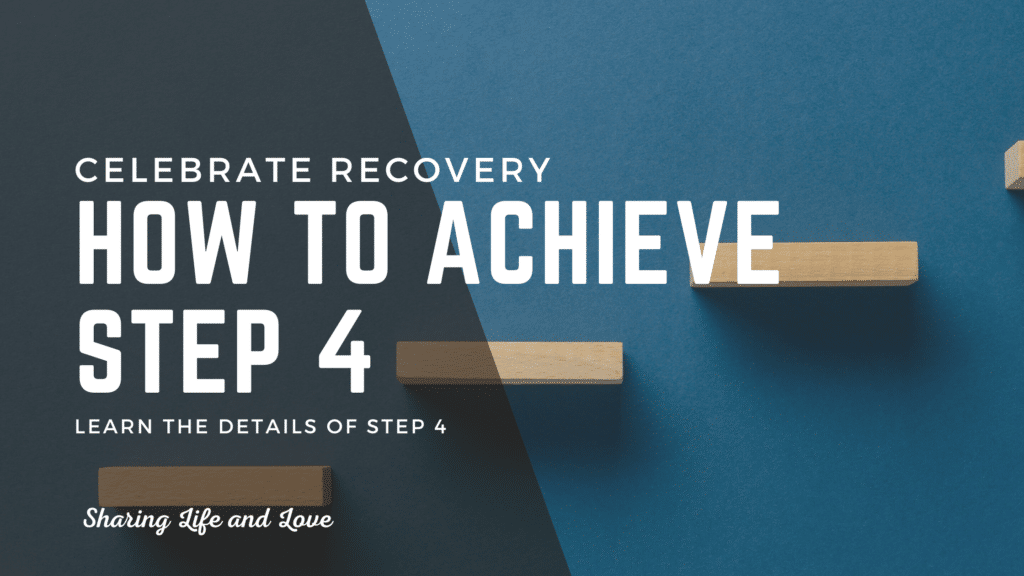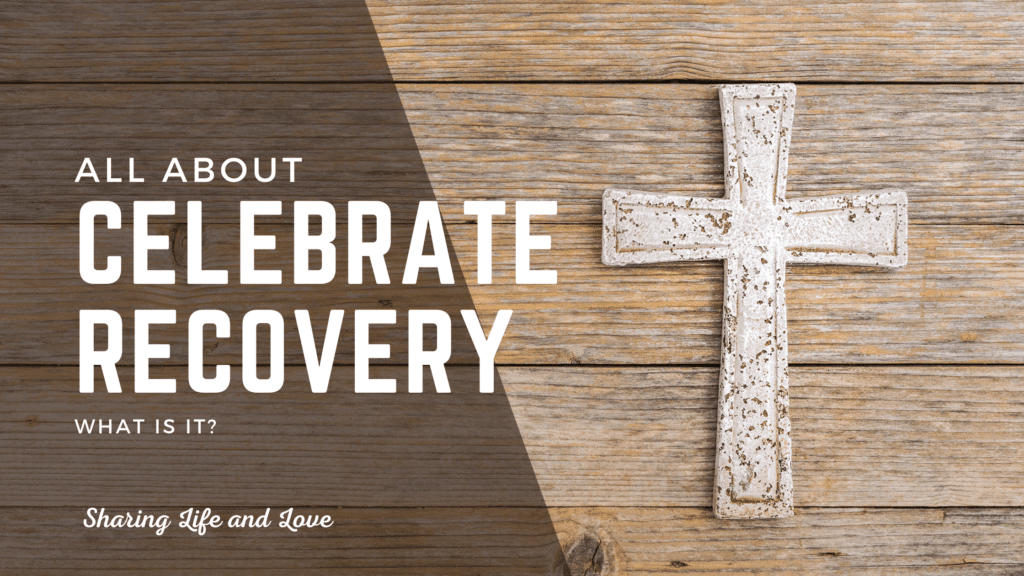Celebrate Recovery Step 4 is a step you take when going through a 12-step Christian recovery program. The two main 12-step recovery programs are Celebrate Recovery (CR) and Alcoholics Anonymous (AA). You will have a “step 4,” whether in AA or CR, but this is about CR.
Now, as you explore the programs, you will notice that Celebrate Recovery’s 12 steps are identical to the ones for AA. However, Celebrate Recovery has 8 principles based on the Beatitudes in the Bible (Matthew 5).
If you are just starting out with your recovery journey, check out Celebrate Recovery Step One! If you just need to be refreshed, read Celebrate Recovery Step Three – the last article in this series.
As one pastor said in so many words, it’s not the blessings that grow your life; it’s the trials and challenges. Believe me when I say that something incredible will happen as you go through Celebrate Recovery step 4. But remember, this will be quite the little adventure!
If you love a good challenge, Celebrate Recovery step 4 will delight you, so be sure to read all of the helpful advice, guidance, and tips in this article.
With the right lessons and study guides, you will really see positive changes in your life. Expect something wonderful to happen!!
This post may contain affiliate links. Please visit our Privacy Policy for more information.
What is Celebrate Recovery Step 4?
Celebrate Recovery Step 4 states: We made a searching and fearless moral inventory of ourselves. Celebrate Recovery Step 4 corresponds with Celebrate Recovery Principle 4 of the 8 Celebrate Recovery Principles.
Celebrate Recovery Principle 4 states: Openly examine and confess my faults to myself, to God, and to someone I trust. The Bible verse that goes with it is Matthew 5:8, which says, “Happy are the pure in heart.”
If you are new to Celebrate Recovery, be sure to check out this article for further clarification on what all this is about – What is Celebrate Recovery? Remember that Celebrate Recovery is for everyone; it doesn’t matter what your story is. We ALL have hurts, habits, and hang-ups!
As mentioned, the listed steps in CR are the same as those in Alcoholics Anonymous (AA). The main difference between the two programs is that AA is secular. Celebrate Recovery is centered around Jesus Christ. This is the very essence of Celebrate Recovery Step 3!
Therefore, I urge you, brothers, in view of God’s mercy, to offer your bodies as living sacrifices, holy and pleasing to God…This is your spiritual act of worship. – Romans 12:1 (TLB)
What Does Celebrate Recovery Step 4 Mean?
In Celebrate Recovery step 4, many people experience the most difficult part of recovery. It seriously does take a lot of work if you do the recovery step the way you should. And truthfully, if you don’t, there is really no point in doing the 12 steps. You need to do them with all your heart.
With all the numbers, steps, principles, and lessons in Celebrate Recovery, your head might be spinning. That’s why we created a FREE printable called Celebrate Recovery Numbers. This will break it all down. Make sure you take a look at this printable resource to stay clear-headed.
Celebrate Recovery step 4 is about creating your moral inventory. This is a list of people you might fear or resent. You might not realize that you held these feelings until you walk through the applicable lessons (CR Lesson 7, Lesson 8, Lesson 9, Lesson 10, and Lesson 11).
With each of the above lessons, you will get a free CR resource – a free study guide to lead you on your road to recovery or a free printable in another variety. Use any and all of these resources!
However you approach this, don’t allow yourself to become overwhelmed. We will go through this in a nice and easy way!
What Does Celebrate Recovery Step 4 Mean to You?
As you examine the people that you fear or resent, you might realize that you do not need to face each one. If you see that facing them will create harm for them, that is NOT part of your recovery.
Be sure to speak to your group leader, accountability partner, and/or sponsor about this for more details.
Part of going through your moral inventory is listing the cause, effect, and damage of what has been done to you. You will look at how their actions or lack of actions affected you.
When you get to the section of your inventory called My Part, you will look at how you have hurt others.
Be sure to work through these lessons with a step study small group or with your sponsor. You need accountability and someone to talk to!
As iron sharpens iron, so one person sharpens another. – Proverbs 27:17 (NIV)
Let’s look at this step in more detail now, paying special attention to the practical aspects of this step.
Finding the Right Connections at Celebrate Recovery
As you give your inventory to a trusted accountability partner or sponsor, the following articles may help you make the right connections. You’ll want to not only be a good friend but also you’ll want to find someone who is both trustworthy and reliable. This is an important part of recovery!!
- Why You Need a Sponsor
- How to Make Christian Friends
- Build Lifelong Connections with New Friends
- Make Spiritual Friendships that Last
Be devoted to one another in love. Honor one another above yourselves. – Romans 12:10 (NIV)
How to Accomplish Celebrate Recovery Step 4
Planning to Write or Give Your Moral Inventory
Before you begin any task or endeavor in recovery, you should implement prayer. This will help you get centered and ready to plan to write or give your moral inventory.
Do not be anxious about anything, but in every situation, by prayer and petition, with thanksgiving, present your requests to God. And the peace of God, which transcends all understanding, will guard your hearts and your minds in Christ Jesus. – Philippians 4:6-7 (NIV)
Questions to Prepare You for Your Inventory
Next, you will want to answer a few basic questions in regard to this adventure you are about to go on – the mission to write your inventory out!
Here are some sample questions to get you started with your inventory:
- Where do you want to go to write out or think about your inventory?
- When will you accomplish this?
- What are your worries about this?
- What are you excited about?
- Why do you believe writing out your moral inventory is important?
As you make your plans, you will want to begin to brainstorm ideas for what you will write in your inventory. The following ideas and questions can help with planning your inventory. Answer as honestly as you can!
- Write out your spiritual testimony – how you became a Christian.
- How are you continuing to live a life for Jesus?
- In what ways have you stepped out of denial?
- What are some of the good and bad moments from your past?
- How long have you been in recovery?
- What led you to recovery in the first place?
If you are struggling to live the life of a Christian, I recommend that you implement Bible study or try starting a Bible reading plan in your daily life. Be sure to check out the Faith section of Sharing Life and Love for even more great resources and encouragement!
Related: How to Build a Relationship with God
Writing Your Moral Inventory
There are 5 parts to the Celebrate Recovery moral inventory. Let’s take a closer look at each of the 5 parts and how to write them out.
On a personal note, I would just like to say that even though this is a bit trying and challenging, I am excited to embark on this journey with you. I am currently in my second CR step study, and we are doing this exact process right now, so I am with you with each step!
As you walk through this process, be sure to grab a copy of the FREE inventory brainstorming worksheet I made. This will help you immensely! The FREE Recovery Inventory Worksheet will give you all the details you need to complete your spiritual inventory! These are each unique!
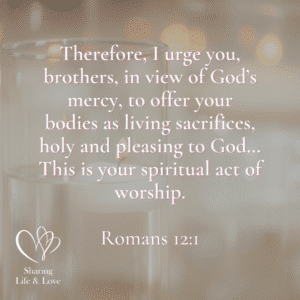
The Person
This is the individual or group that is making you feel the fear, anger, or resentment that you are feeling. Maybe this is a co-worker, someone you used to drink with, a neighbor, an old friend, or your parents.
The Cause
What happened that caused you to feel fear, resentment, or anger toward this person or group of people? Share the details that woke up these negative feelings for you. Maybe someone encouraged you to go drinking, to talk bad about others, or to use drugs.
The Effect
What was the result of the actions or events of this person or group of people? How did this impact you? What were the lasting repercussions? Maybe you got into an accident or ended an important relationship that you previously enjoyed because of this.
The Damage
Now, list specifically how you were injured. It could have affected your social status, your sexuality, your sense of security, and/or something else. Maybe you are frightened of people who say certain words or do certain things because of past trauma.
My Part
This looks at things in a different light. It is now time for you to take the hot seat and determine what you did that caused this event to take place or the harm to the other person or people. Maybe you previously yelled at your spouse or gossiped about co-workers.
Of course, if you are an abuse victim, you do not need to complete this section. This is further explained in the study guide.
Writing Your Spiritual Inventory
As you walk through the spiritual inventory, you might feel overwhelmed. There are many questions that can help you complete your inventory. Let’s take a look at some of those now.
Questions About Relationships
- How did others hurt you? Are you still bitter about this?
- Who has made you cry? How?
- How have you hurt others?
- Who do you envy, and why?
- Do you gossip or criticize others? Who and why?
- Do you blame others for your problems? Who and why?
Keep building healthy relationships with people at Celebrate Recovery, and always nurture your bond with the Lord.
Questions About Life
- In what ways do you trust God?
- In what ways are you still trying to be the one in control of your life?
- What is keeping you from following God with all your heart?
- How would you list (in what order) all of the priorities in your life?
- How do you create and accomplish goals?
- What are your future goals?
Be sure to grab a FREE Spiritual Goal Worksheet and read the articles on How to Set Goals and Examples of Spiritual Goals! This will greatly help you with that last question!
If you are still trying to figure out your goals and spiritual purpose in this life, you are not alone! Many people struggle in this area. Continue to ask God for guidance, and your way will be revealed with time!
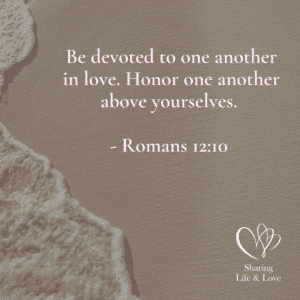
Questions About You
- What are you thankful for? (Read about an Attitude for Gratitude).
- What angers you the most?
- When are you sarcastic, worried, prideful, or humble?
- How has recovery changed you?
- What are you still worried about in your life?
- Are you living a righteous life? In what ways are you struggling?
- When have you been dishonest?
- How have you mistreated your body?
- What have you done to treat your body better now that you’re in recovery?
- How have you gotten out of denial?
As you think about these things, be sure to pray. You might want to try to pray the Scriptures over your life and everything you have been through.
Questions About Your Family
- Have you mistreated or hurt anyone in your family physically, mentally, or emotionally?
- Why did you do those things?
- Do you owe amends to anyone?
- What relationships are you nurturing today?
- What improvements are you making in your relationships?
Think about the healthy relationships that you have formed since being in recovery. If you are still working on that, it’s okay and completely normal. It’s a process and WILL happen with time.
Read more about having a spiritual marriage, praying for your husband, or praying for your future husband!
Questions About Your Spirituality
- What have you given up since accepting Christ in your heart?
- How have you been transformed spiritually?
- In what areas are you still struggling to follow God’s Will? How can you improve?
- In what areas of your life are you keeping unhealthy spiritually? Why?
- How are you currently guarding your mind? How are you not doing this well?
- How will you change to let God’s Will be done in your life?
Read more about how to build a relationship with God in this four-part series with 25 well-developed points that will point you in the right direction!
Questions About Your Church
- What is your level of participation in your church?
- What was it before you started going to recovery?
- In what ways did you change? Why?
- Why do you go to church?
- Why did you previously go to church?
- Have you hindered others from going to church?
If you haven’t found a church home yet, be sure to check out some churches online. That will get you started going to church. However, to fellowship with other believers and see a real impact on your life, you need to physically go to church. Learn more about how to go to church!
More Tips for Celebrate Recovery Step 4
- Continue going to all the Celebrate Recovery meetings as you can! Want to know some of the benefits? Check out the top 30 benefits of going to CR!
- Be welcoming to new people! Remember what it was like when that was you!
- Continue to pray and study your Bible. Spend time developing your relationship with God!
- Join a CR step study! You will thrive in your recovery!
- Memorize scripture, especially the recommended reading in the CR Study Guide (page 29). One suggestion is Isaiah 1:18. Another is Joshua 1:9.
- Make sure to keep your inventory balanced with both good and bad things! Do not dwell on the negative too much, or you’ll likely find yourself in quite a bad mood!
- Work on memorizing the Serenity Prayer for even more encouragement!
- Continue building your support team – your accountability partners and sponsor.
Related: Celebrate Recovery Lesson 7: Sponsor
Related: Celebrate Recovery Lesson 8: Moral
Related: Celebrate Recovery Lesson 9: Inventory
Related: Celebrate Recovery Lesson 10: Spiritual Inventory Part 1
Related: Celebrate Recovery Lesson 11: Spiritual Inventory Part 2
Grab the Celebrate Recovery Study Guide Book 2 for your step study or for more information!
For God is at work within you, helping you to want to obey Him and then helping you do what He wants. – Philippians 2:13 (TLB)
More Celebrate Recovery Step 4 Resources
A Celebrate Recovery Step 4 Video
Celebrate Recovery Step 4 Video
More Celebrate Recovery Step 4 Resources
- Check out the Celebrate Recovery NIV Study Bible. It has great notes that are perfect for recovery!!
- The Celebrate Recovery 365 Devotional Book is wonderful to use during your time with God. I am currently walking through this each day of the year.
- The Celebrate Recovery Blog Series – We have several other Celebrate Recovery articles. You can find free worksheets and free study guides in the Shop, or get started by reading the first article – What is Celebrate Recovery?
- If you have not purchased the second study guide for Celebrate Recovery, you ought to look into getting that! It has questions and materials that you will need in your step study.
Frequently Asked Questions
What are some examples of character defects?
According to Collins Dictionary, your character is what makes you who you are. Essentially it means how you are different from others. If you have a character flaw or something negative that needs to be changed, that is your character defect.
What does step 4 mean in NA?
NA is Narcotics Anonymous, another 12-step program. In NA, the 12 steps are the same as those found in Celebrate Recovery or in AA. Step 4 tells us to do a searching and fearless inventory of ourselves and our lives. Read all 12 steps in this Free 12 Step Printable.
What does it mean to take a moral inventory?
A moral inventory takes a deep look at what you might be in denial about. For example, if you struggle with perfectionism as I do, as you write your moral inventory, you will unearth the truth regarding that character defect. Then, you can work to correct it.
How do you do a resentment inventory?
In a resentment inventory, you would ask some of the questions that we covered in this article. However, in this case, you would focus solely on any resentment you have, including a list of the people that are causing you to feel resentment.
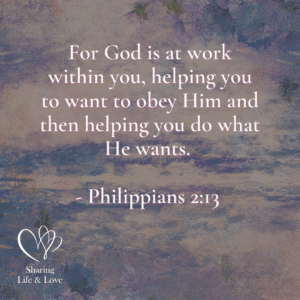
What are the spiritual principles of step 4?
Step 4 calls us to make a searching and fearless inventory of ourselves. If you are searching for your spiritual calling in regard to this, pray about the matter. Your spiritual purpose will be revealed to you in time. Create spiritual goals once you uncover your purpose or calling!
Conclusion
You should now know how to do step 4 in recovery. Celebrate Recovery Step 4 brings you into the deep realms of recovery as you create your inventory.
If you need more detailed instructions on how to write your inventory, be sure to follow the links that this article provides. This will show you the many lessons, free study guides, and free worksheets that correspond with Celebrate Recovery step 4!
If you have done your moral inventory already, leave a comment! We’d love to hear what questions popped up and how you wrote and gave yours! Keep working through the 12 steps, and you’ll succeed!

